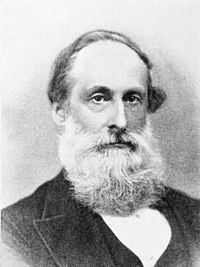Daniel Hack Tuke

Daniel Hack Tuke (19 April 1827 - 5 March 1895) was an English physician and expert on mental illness.[1]
Family
Tuke came from a long line of Quakers from York who were interested in mental illness and concerned with those afflicted. His great-grandfather William Tuke and his grandfather Henry Tuke co-founded the Retreat, which revolutionized the treatment of insane people.
His father Samuel Tuke carried on the work of the York Retreat and reported on its methods and its results. Daniel's older brother James Hack Tuke (1819 - 1896) was the next overseer of the York Retreat. Daniel was the youngest son of Samuel Tuke and Priscilla Hack, his wife.
Tuke's son was the painter Henry Scott Tuke.
Career
In 1845 Daniel Tuke entered the office of a solicitor at Bradford, but in 1847 began work at the York Retreat. Entering St Bartholomew's Hospital in London in 1850, he became a member of the Royal College of Surgeons in 1852, and graduated M.D. at Heidelberg in 1853. In 1858, in collaboration with John Charles Bucknill, he published a Manual of Psychological Medicine, which was for many years regarded as a standard work on lunacy.
In 1853 he visited a number of foreign asylums, and later returning to York he became visiting physician to the York Retreat and the York Dispensary, lecturing also to the York School of Medicine on mental diseases.
In 1859 ill health obliged him to give up his work, and for the next fourteen years he lived at Falmouth. In 1875 he settled in London as a specialist in mental diseases. In 1880 he became joint editor of the Journal of Mental Science.[2]
Marriage
In 1853 he married Esther Maria Stickney (1826–1917). They had three children, the second son being Henry Scott Tuke RA (1858–1929).
Death
He died on 5 March 1895 and was buried at the Quaker Burial Ground, Saffron Walden.
Publications
Among his works were:
- Illustrations of the Influence of the Mind on the Body (1872)
- Insanity in Ancient and Modern Life (1878)
- History of the Insane in the British Isles (1882)
- Sleepwalking and Hypnotism (1884)
- Past and Present Provision for the Insane Poor in Yorkshire (1889)
- Dictionary of Psychological Medicine (1892).[2]
References
- ↑ ODNB article by Anne Digby, ‘Tuke, Daniel Hack (1827–1895)’, Oxford Dictionary of National Biography, Oxford University Press, 2004 , accessed 1 April 2008.
- ↑ 2.0 2.1
 One or more of the preceding sentences incorporates text from a publication now in the public domain: Chisholm, Hugh, ed. (1911). "Tuke". Encyclopædia Britannica 27 (11th ed.). Cambridge University Press. p. 365.
One or more of the preceding sentences incorporates text from a publication now in the public domain: Chisholm, Hugh, ed. (1911). "Tuke". Encyclopædia Britannica 27 (11th ed.). Cambridge University Press. p. 365.
External links
| Wikisource has original works written by or about: Daniel Hack Tuke |
- Works by Daniel Hack Tuke at Project Gutenberg
- Works by or about Daniel Hack Tuke at Internet Archive
|